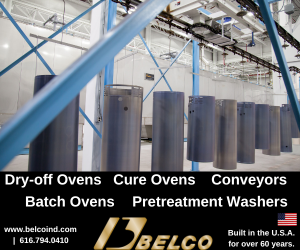Offshoring Issues
Do you have any suggestions or for how we could improve the process of offshoring our production?
Q: Our company is planning to offshore manufacturing and plating of a number of parts that previously have been made in the U.S. We’ve found that the process is not as easy as we thought. The main issue is reproducibility and quality of the finished parts. Do you have any suggestions or for how we could improve the process of offshoring our production? D.S.
A: This question comes at a good time, as offshoring and outsourcing are “hot” political topics. In the past couple of years I have been called upon to help companies with their offshoring of plating requirements. Many of these companies are smaller and have minimal experience with the process. Yes, I do have some suggestions.
First, I should mention that I’m not a big fan of offhsoring. I strongly believe that offshoring, while delivering less expensive products, ultimately weakens the economic position of the U.S. However, having worked in sales and marketing during a portion of my career, I understand the pressure to produce products with the lowest possible cost.
One of the biggest mistakes companies make is to not determine the type of metal finishing process required prior to finding a suitable offshore vendor. I have been involved in a number situations in the past few years in which companies have come to me after they have attempted to find a suitable vendor and need technical assistance in trying to stabilize and “lock-in” a process. In some cases, this is because the company has never manufactured their own parts and has always outsourced the manufacturing to other companies in the U.S. In other cases, the company is new to the manufacturing side of production, and its designers and engineers are not familiar with metal finishing processes.
The first thing a company must do, in my opinion, is to develop a prototype process. Developing a prototype process allows you to have a solid set of procedures you can take to potential vendors. The prototype process should be developed close to home, i.e., in the U.S. The question is often asked: Will a typical metal finishing company work with me developing a prototype process? The answer is yes, they will—if you are upfront and make it clear that you will pay them for their process development expertise, but you will take the process offshore.
An example of what can happen if you do not have a well-defined plating process is taken from my own experience. A company contacted me and explained that they had specified a particular nickel finish. Working with an agent, the company found two plating facilities that claimed they could produce the required finish. After spending a number of months trying to standardize the process without any success, the company decided to contact me to help them solve the problem. We were able to solve the problem locally, but if my client had developed a prototype process first, the path to success would have been quicker and much less expensive.
There are a few other items that a company should consider when deciding to offshore metal finishing processes.
- Do I have to send my design and manufacturing engineers to the potential vendor? It’s not cheap to travel overseas. If this has to be done on a regular basis, the dollars spent can add up quickly.
- What are the logistics involved? Are the finished parts small, lightweight and air-shippable, or are they heavy and require ocean transportation?
- What type of schedule can the vendor adhere to? Six-week turnaround, 12-week turnaround? Twelve weeks can be a very long time when selling into a quickly changing market.
- What is the cost of transportation? Eighteen months ago, the cost of transportation did not seem to be an important part of the outsourcing equation. This of course has changed, and in many cases can add as much as a 20–25% additional cost to the finished product. This may change somewhat as we enter a global recession.
In the last six months or so, I have been told by a number of well-recognized companies that they are seriously considering moving the manufacturing of parts of their product line back to North America. Reasons given for this vary, but can be attributed to the four items mentioned above.
I’m sure our readers can add additional insight to the offshoring/outsourcing issue, and I would like to hear from them.
Related Content
Innovation in Plating on Plastic
Plating on advanced plastics solution offers improved adhesion, temperature resistance and cost savings.
Read MoreTrivalent Chrome Overview
As the finishing industry begins to move away from the use of hexavalent chromium to trivalent chromium, what factors should finishers consider as they make new investments? Mark Schario, chief technology officer for Columbia Chemical offers a helpful overview of this complicated topic.
Read MoreAn Overview of Electroless Nickel Plating
By definition, electroless plating is metal deposition by a controlled chemical reaction.
Read MoreProducts Finishing Reveals 2024 Qualifying Top Shops
PF reveals the qualifying shops in its annual Top Shops Benchmarking Survey — a program designed to offer shops insights into their overall performance in the industry.
Read MoreRead Next
Delivering Increased Benefits to Greenhouse Films
Baystar's Borstar technology is helping customers deliver better, more reliable production methods to greenhouse agriculture.
Read MoreA ‘Clean’ Agenda Offers Unique Presentations in Chicago
The 2024 Parts Cleaning Conference, co-located with the International Manufacturing Technology Show, includes presentations by several speakers who are new to the conference and topics that have not been covered in past editions of this event.
Read MoreEpisode 45: An Interview with Chandler Mancuso, MacDermid Envio Solutions
Chandler Mancuso, technical director with MacDermid Envio discusses updating your wastewater treatment system and implementing materials recycling solutions to increase efficiencies, control costs and reduce environmental impact.
Read More














.jpg;maxWidth=300;quality=90)











